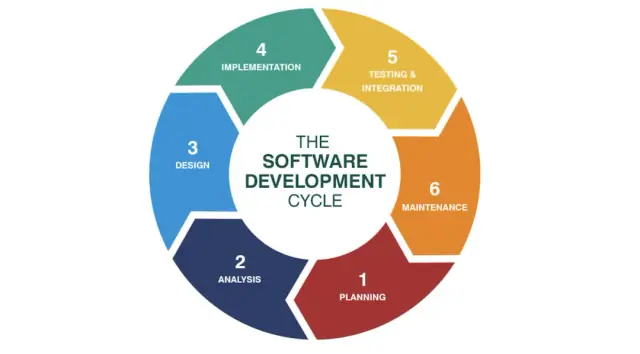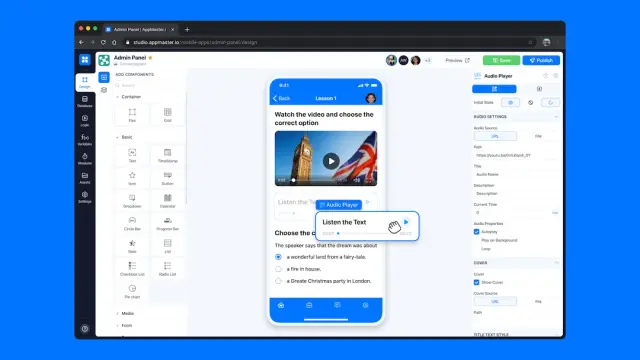Development Team
A software development team is the most vital part of any software business. Keep reading to learn everything about development teams!

No matter how good an idea you have, it can't become successful without proper implementation. There are several aspects to take care of in a software project, from ideation to deployment. But all of these revolve around one thing: the development team. The development team is responsible for creating and maintaining your software, and any business needs a good development team to succeed.
You can't create a perfect software development team immediately. You should consider and decide on many things before beginning to put together a team of software developers. This includes things like the functionality you want to achieve, the tech stack you want to use, your budget, and more. Let's take a detailed look at development teams and the various software developers they have.
Development team roles: Overview
A structure called Scrum is used for creating, deploying, and maintaining complex systems. A scrum team serves as a framework for solving complex adaptive issues. They can simultaneously produce goods with the best potential successfully and originally. The scrum team is a project management methodology used mostly in agile methodology that is gradual and continuous. The scrum team has functional software, adaptability to changes and new business circumstances, and rising collaborative and communication trends.
A software development team is a group of individuals who collaborate to achieve a common objective. They aim to create software that is tailored toward a target audience via cooperation and an effective procedure. The development team members are made up of internal staff, a group of independent contractors, or both. They can achieve the business objectives if they cooperate with the established needs and constraints.
The development team can use any framework of the SDLC - software development life cycle chosen by the firm. This can include models like the waterfall model, the agile methodology, the V model, and more. Several roles in the development team are crucial, like the project manager, the team lead, the scrum master, the product owner, the software architect, and more.

Types of development teams
There are three primary methods for creating a scrum development team. They are the generalist, specialist, and hybrid approaches. The kind of development team you set up should depend on your needs, available options, and specifications. Keep in mind that the success of your project rests on creating a clear structure. Knowing the advantages and disadvantages of all of them allows you to decide which one will suit your business and idea best.
Generalist development teams
Generalist software development teams consist of experts with various skills and knowledge. They can successfully handle end-to-end solutions to various issues that may develop since they are masters of all professions. The drawback is that they struggle to manage tasks requiring fewer skills.
Direct interaction and teamwork can result in good productivity. A flutter engineer could be skilled in SQL for database manipulation in such a software development team. Or a project leader who knows UI and UX can help in areas outside management.
Specialist development teams
In a specialist scrum team, each group member will be an expert with some skills, like a particular computer language or tool. For example, you might only want to work with people who are experts in Vue.js or Python. The software development team can build your app successfully and effectively since they have the necessary skills, knowledge, and experience.
However, since they all have the same knowledge, it can be difficult to tackle problems that are not within their area of competence. To finish a part of the product, you can create software development teams with their system and structure.
Hybrid development teams
If you want some skills of the generalist approach and others of the specialist one, then you can combine them. Specialists and generalists might be combined to achieve the greatest results. The generalists can then address solutions in their areas of expertise. At the same time, specialists might focus on functional areas that fall inside their domain of knowledge.
Both people who focus on a project in its entirety and those who can focus more narrowly when necessary are available. A team like this will have many purposes, and if your company has the right amount of resources, you can create a hybrid team. A hybrid scrum team has skills that can help you more while handling complicated issues.
Software development team: what is the ideal size?
A development team does not have a set team size. This depends on the team and its business goals. A software development team must preferably be both big enough to finish a significant number of tasks within a given time and small enough to maintain its agile methodology. The right-sized software development team can produce the best projects.
The number of interactions will be lower if the software development team has fewer than three individuals, which will inevitably lead to lower efficiency. Very small software development teams may frequently run into skill limitations.
But at the same time, having a huge development team is also detrimental. Communication issues may occur if the development team is larger than 9. Additionally, extremely big development teams create needless complexity. These figures usually exclude vital roles like the team lead and the project manager.
Software development team roles
Some of the most crucial roles in a scrum development team are:
Product owner
The Product Owner in a software development team has extensive product and user knowledge. They are aware of the customer's viewpoint and requirements and work to realize the goals and specifications of the finished service or product. The scrum master and a product owner can have similar duties. Since a Product Owner's judgments must be supported by established business analysis and observing industry trends, they must also be adaptable, innovative, meticulous, and critical. They should also set up sprint reviews whenever necessary.
Developer
The developer builds the product and should be skilled in the tech stack you need. They are also known as a product engineer. They apply their technical expertise in the creation of software. They perform the capabilities that the product owner requires. In addition to that, they create updates and enhancements for current systems. They also work on creating accurate program documentation for future use.
Product manager
The project manager will be the main point of contact for the product owner. In addition to helping the customer, this person is in charge of everyday team management. The role also determines the software development team's objectives and success indicators. A project manager ensures that workflows are effective and that everyone is adhering to the deadline and standards that have been established. They can also be the team lead. The project manager also guides the software development team in completing any additional needs, if there are any.
Software architect
A software architect establishes coding standards, along with platforms and tools, and bases them on non-functional criteria. The software architect is in charge of examining the code, guaranteeing the caliber of the design, avoiding excessive complications, and emphasizing clarity. A flawless software architect is knowledgeable in coding, human resource management, psychology, clear communication, and financial oversight. A software architect must offer technical assistance and be familiar with the specifications from the project's inception through its release, development, and completion of improvements. Other roles also necessary for a software development team are quality assessment software developers, UI/UX designers, and business analysts.
Traditional development team vs no-code development team
Programming had changed a lot from when it started. Unlike how coding is usually approached, it is now possible to create entire applications without intensive and conventional coding. This is where the no-code approach comes in. As the name suggests, no-code development is software creation without coding. Many no-code platforms let you create working applications without writing a single line of code.

AppMaster is a no-code platform that lets you create the source code from scratch. The platform can complete the same software process as an entire team but faster and with fewer expenses. This is made feasible by the platform's capacity to produce source code dynamically. The final source code will belong to the user exclusively, so there are no issues with the rights either.
With traditional development, you need to have at least one person per stack (backend, frontend, mobile development); of course, a full-stack developer can handle it, but this is not suitable for all projects. Large projects often prefer highly specialized software developers. In addition to ordinary software developers, team leads are also required. The large size of the team imposes difficulties in the form of a decrease in speed and the need for additional meetings and communications.
In the no-code approach, you don't need a large team; often, one person can handle your project and will create the application architecture. If we are talking about AppMaster, one architect, developer, or project manager will be enough. When working with AppMaster, minimal technical knowledge is required. The specialist must understand the basics of databases, API, how endpoints work and what they are for. Having such a store of knowledge, a specialist with the help of AppMaster, not knowing how to program in several languages, can independently create a project with a backend, frontend, and mobile applications for IOS and Android.
Conclusion
The quality of your development team members and software developers can be the reason for your success or downfall. Businesses need to be careful while selecting candidates for their development teams. Mistakes or carelessness in the hiring process can cause your project many problems down the lane.
It is also important to ensure that your software development team members are well-suited to your company goals. It would help if you tried to give them an encouraging space to work as well. You should enquire if they have all that they need at each sprint review. You're already on the right path to success with a good software development team and a good working environment.





